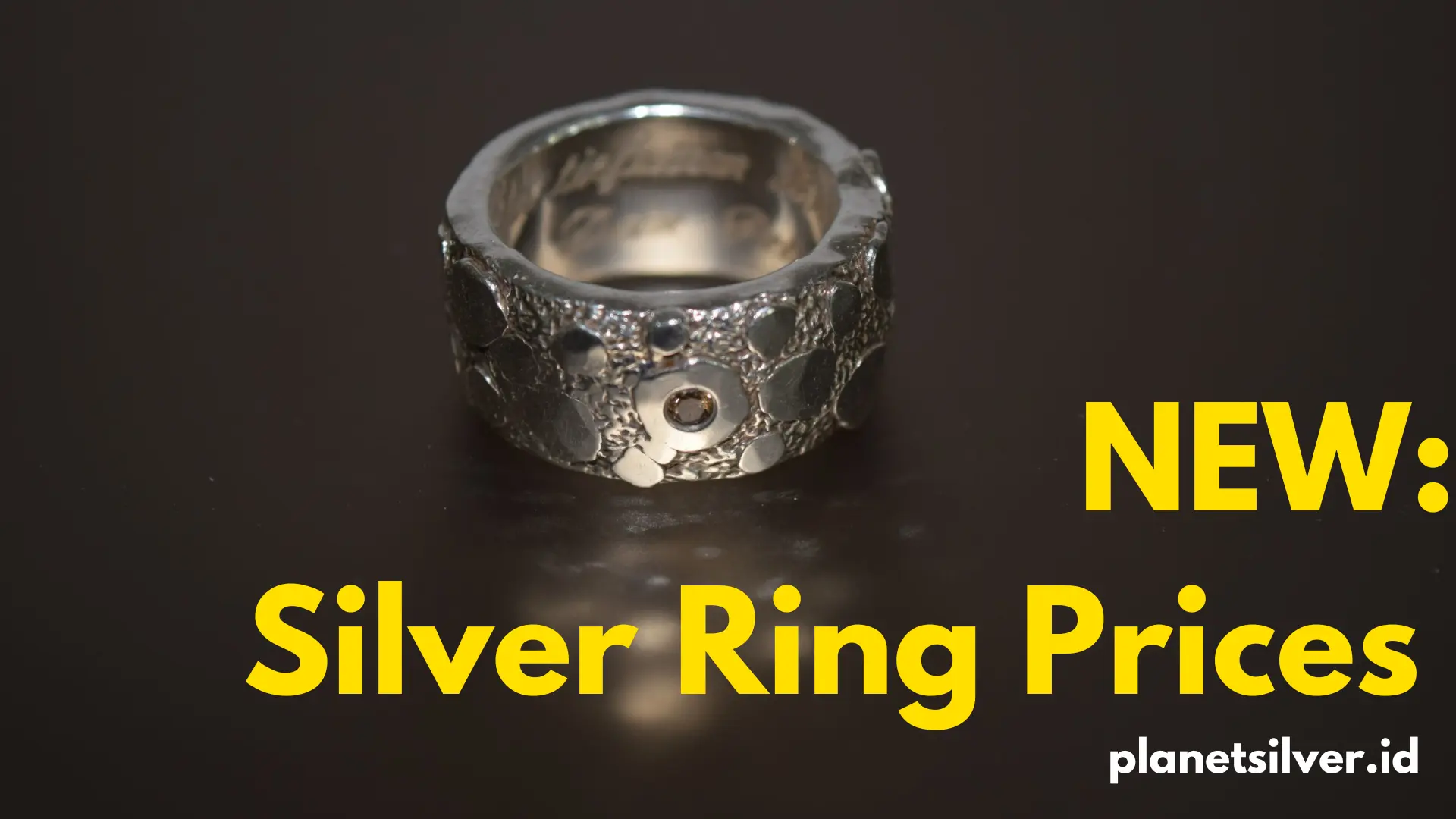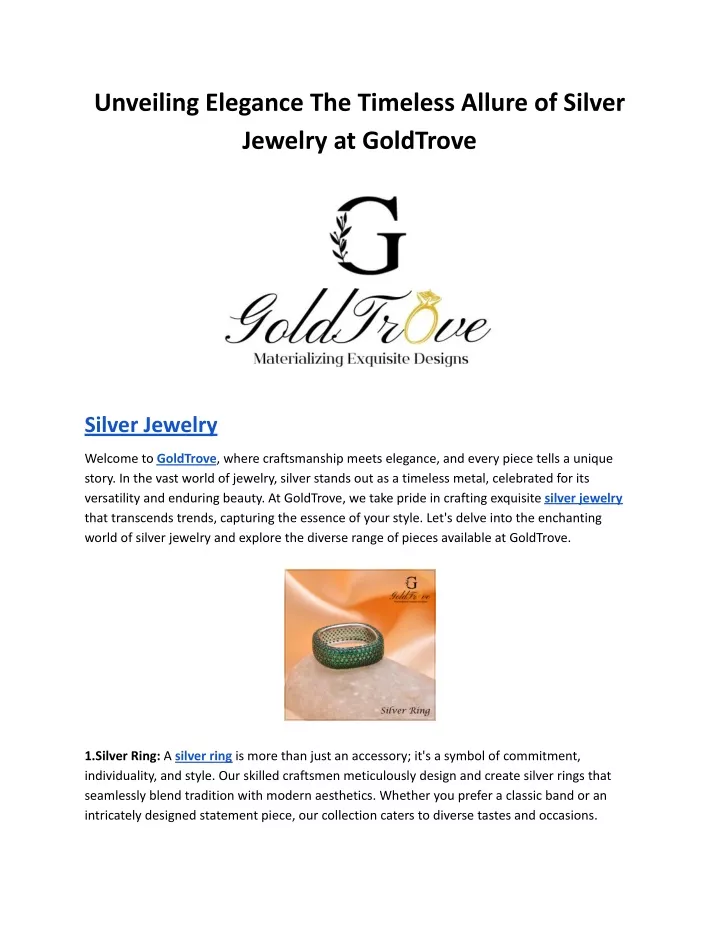Unveiling the Value of Your Silver: A Comprehensive Guide to Local Jewelry Stores
Related Articles: Unveiling the Value of Your Silver: A Comprehensive Guide to Local Jewelry Stores
Introduction
In this auspicious occasion, we are delighted to delve into the intriguing topic related to Unveiling the Value of Your Silver: A Comprehensive Guide to Local Jewelry Stores. Let’s weave interesting information and offer fresh perspectives to the readers.
Table of Content
Unveiling the Value of Your Silver: A Comprehensive Guide to Local Jewelry Stores

Silver, with its lustrous beauty and enduring value, holds a special place in the world of precious metals. Whether it’s inherited family heirlooms, unused jewelry, or even antique silverware, many individuals find themselves in possession of silver items they may no longer need or want. This often leads to the question: "Where can I sell my silver locally?" The answer lies within the community itself, specifically with local jewelry stores that specialize in buying silver.
Understanding the Process: Selling Silver to Jewelry Stores
Jewelry stores that purchase silver offer a convenient and often lucrative avenue for individuals to monetize their silver assets. The process is typically straightforward and transparent:
- Initial Assessment: The jewelry store will assess the silver items you wish to sell. This involves determining the type of silver (sterling, coin, or other alloys), its weight, and its condition.
- Valuation: Based on current market prices for silver, the store will provide a valuation for your items. This valuation may take into account factors such as age, craftsmanship, and any unique characteristics of the silver.
- Negotiation: The jewelry store will typically offer a price for your silver, which you can either accept or negotiate.
- Payment: If you accept the offer, the jewelry store will typically pay you in cash, check, or other forms of payment.
Factors Influencing Silver Prices
The price of silver is subject to fluctuations based on various economic and market forces. These factors include:
- Global Demand: The global demand for silver, driven by industries like electronics, solar energy, and jewelry, plays a significant role in its pricing.
- Supply and Mining: The amount of silver mined and available in the market directly impacts its price.
- Economic Conditions: Economic factors like inflation, interest rates, and currency fluctuations can influence the value of precious metals.
- Speculation: Silver is also susceptible to speculation, with investors buying and selling it based on market trends and predictions.
Why Choose Local Jewelry Stores?
While online platforms offer convenience for selling silver, local jewelry stores provide several advantages:
- Expertise: Local jewelers possess extensive knowledge of silver, its different forms, and its value. They can accurately assess your items and offer fair prices based on their expertise.
- Transparency: Working with a local store allows for face-to-face interaction, fostering transparency in the valuation process.
- Local Support: Supporting local businesses strengthens the community and provides a sense of trust and familiarity.
- Security: Local stores offer a secure environment for selling your valuable silver items.
Key Considerations When Selling Silver
When considering selling your silver, remember these important points:
- Research: Compare prices and policies across different local jewelry stores to ensure you receive the best possible offer.
- Condition: The condition of your silver items significantly impacts their value. Clean and polish your items before selling them to maximize their appeal.
- Documentation: If you have any documentation or certificates of authenticity for your silver, bring them along for verification.
- Legality: Ensure that the jewelry store is licensed and reputable to buy and sell precious metals.
Frequently Asked Questions (FAQs) About Selling Silver to Jewelry Stores
1. What types of silver do jewelry stores typically buy?
Jewelry stores typically buy a variety of silver items, including:
- Sterling silver: This is the most common type of silver used in jewelry, with a purity of 92.5%.
- Coin silver: This silver alloy is often used in antique silverware and coins.
- Silver bullion: This includes silver bars, rounds, and other forms of unrefined silver.
- Silver jewelry: From rings and necklaces to earrings and bracelets, jewelry stores accept a wide range of silver jewelry items.
- Silver flatware: Antique silverware, such as forks, knives, and spoons, can also be sold to jewelry stores.
2. What documents do I need when selling silver?
While not always necessary, it’s beneficial to have documentation that supports the authenticity and value of your silver. This may include:
- Certificates of authenticity: These documents prove the origin and quality of your silver items.
- Appraisals: A professional appraisal can provide an independent estimate of the value of your silver.
- Receipts or invoices: These documents can help establish the provenance of your silver items.
3. What happens to the silver I sell?
Jewelry stores typically melt down the silver they purchase and sell it to refiners or other buyers. This process is essential for extracting pure silver from the various alloys and items they receive.
4. How do I find jewelry stores that buy silver near me?
You can find local jewelry stores that buy silver by:
- Online searches: Use search engines like Google and Bing to search for "jewelry stores that buy silver near me."
- Local directories: Check online directories like Yelp and Yellow Pages for local jewelry stores.
- Word-of-mouth: Ask friends, family, and neighbors for recommendations.
Tips for Selling Your Silver to Jewelry Stores
- Compare prices: Obtain quotes from multiple jewelry stores to ensure you receive a fair price.
- Negotiate: Don’t be afraid to negotiate with the jewelry store. Research current silver prices and be prepared to discuss your expectations.
- Clean your silver: Clean and polish your silver items to enhance their appearance and maximize their value.
- Be patient: The selling process may take some time, so be patient and persistent.
- Consider other options: If you’re not satisfied with the offers from local jewelry stores, explore other avenues for selling your silver, such as online platforms or pawn shops.
Conclusion
Selling silver to local jewelry stores offers a convenient and often rewarding way to monetize your silver assets. By understanding the process, factors influencing silver prices, and key considerations, you can navigate the selling process confidently and receive a fair price for your valuable silver items. Remember to research, compare, and negotiate to ensure you get the best possible outcome.








Closure
Thus, we hope this article has provided valuable insights into Unveiling the Value of Your Silver: A Comprehensive Guide to Local Jewelry Stores. We hope you find this article informative and beneficial. See you in our next article!
